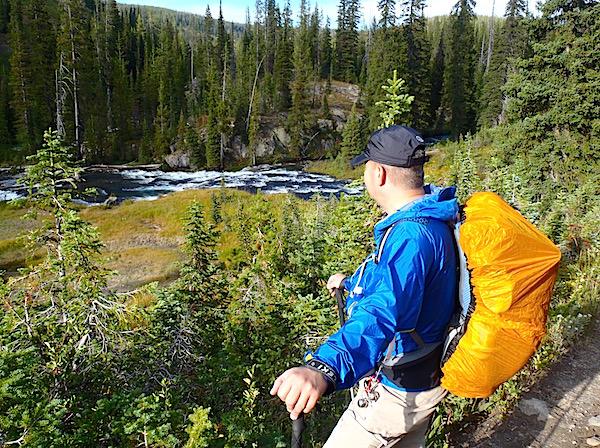
Enjoying Yellowstone's backcountry will cost you a little more/Kurt Repanshek
If you're planning a backcountry trip in Yellowstone National Park, it's going to cost you a little bit more. This month the park's new fee for backcountry travel is taking effect.
Ivan Kowski, the park's backcountry manager, told the Yellowstone Association that about 18,000 people spend a night under the stars in Yellowstone's backcountry each year. It takes nine backcountry offices, located at ranger stations throughout the park, to administer permits and relay important information about bear safety and trail conditions to backcountry travelers, the association notes in a newsletter.
"Previously, fees received through advance backcountry campsite reservations covered only about 17 percent of the cost of operating the backcountry offices," the association said. "The new permit fees are estimated to cover 40 percent of the cost."
Yellowstone's backcountry contains roughly 1,000 miles of trail, and 300 backcountry campsites.
Anyone obtaining a permit to stay overnight in the backcountry between Memorial Day and September 10 will pay a per person, per night permit fee for all individuals 9 years of age or older. Backpackers and boaters will pay $3 per person, per night, up to a total of $15 per night for groups of 5 or more. Stock users will be charged $5 per person, per night. (There is no permit fee for backcountry camping dates prior to Memorial Day and after September 10).
If you take frequent trips into the backcountry, you have the option to purchase an Annual Backcountry Pass for $25, which will cover the per person, per night fees for one year. The fee for advance reservations remains $25.



Comments
Gary, perhaps you will answer the question that Rick B as run from. How does Yellowstone have an annual back country fee when the SMNP superintendent claims establishing an annual back country fee in an NPS unit is not possible. That is the issue Smokies is raising.
Yellowstone also has an entrance fee, which generates millions of dollars in revenue for the park to utilize. GSMNP does not have a gate fee, and relies mostly on federal tax dollars, and donations from the GSMA and FOTS to run the park. There are definitely not complete standards that apply across the board at all the National Parks. Should there be? That's a complex question with a variety of answers, that's not so black and white.
I'm not running. My gift to you, Eric, is that I'm chosing to walk away from the sorts of junior high school debating society drivel that you've sucked me into for the past too many years. As I turn my back on you, you can write anything in the world that you want to say and you will indeed have the last word. Go for it. I'll continue to discuss politely with those capable of it.
Perhaps not but that still doesn't justify the Superintendents statement (assuming he made it). Annual backcountry fees aren't illegal or impossible, he just chooses not to take that route. Obviously he is free to make that choice but he should take the criticism for his stance rather than lie about why the decision was made and try to blame someone else.
I personally think that yellowstone would have followed the smokies model and had no yearly pass or cap. However, they saw the outrage from the smokies lawsuit and people who asked for that and it was ignored due to poor management at the time. The Yellowstone super is smart to add that option in. I also think if the smokies super had done something small like this it would have possibly made a big difference.